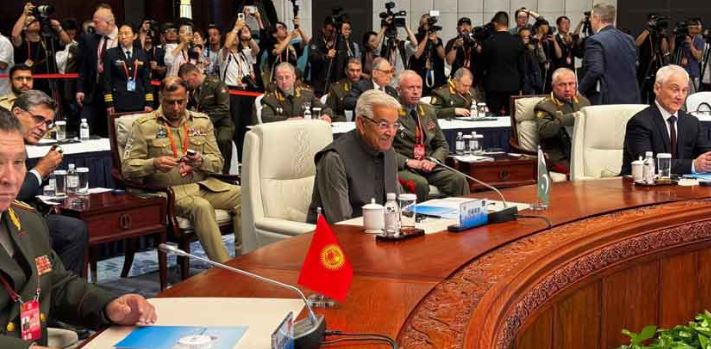Pakistan reaffirms regional peace, anti-terror commitment at SCO summit
QINGDAO: Pakistan has reiterated its strong commitment to regional peace, security, and multilateral cooperation at the Shanghai Cooperation Organization (SCO) Defence Ministers’ Meeting and Energy Conference.
Defence Minister Khawaja Asif addressed the forums to highlight Pakistan’s strategic priorities in security and energy collaboration.
Speaking at the SCO Defence Ministers’ Meeting in Qingdao, Asif strongly condemned the recent Israeli military aggression against Iran, calling for restraint, dialogue, and diplomacy to ease regional tensions. He also drew the attention of the international community to the ongoing humanitarian crisis in Gaza, urging the international community to press Israel for a permanent ceasefire and ensure uninterrupted humanitarian assistance.
He emphasized the importance of collective efforts to address evolving global and regional security challenges. Reaffirming Pakistan’s commitment to the UN and SCO charters, the minister emphasized non-aggression, peaceful dispute resolution, and the territorial integrity of all states. Stressing the importance of regional cooperation, he stated.
“Pakistan is committed to working with SCO partners to address evolving global and regional security challenges.”
Highlighting the threat of terrorism, Asif said: “Terrorism is a common threat. Pakistan calls on all states to desist from politicizing the joint effort of the international community to fight the means of terrorism to deflect attention from their internal failures.”
He stressed that Pakistan condemned all forms and manifestations of terrorism, including the attack in the India-held Kashmir. “We call upon all states to hold these states and their state actions to account who planned, financed and sponsored terrorist attacks such as Jaffar Express in Balochistan.”
The minister referenced Pakistan’s operations against banned outfits such as TTP, BLA, and ISKP, and reaffirmed the country’s zero-tolerance policy toward terrorism. He also mentioned India’s involvement in cross-border terrorism, including the arrest of serving Indian naval officer Kulbhushan Jadhav, “who confessed to financing, planning and perpetrating multiple terrorist attacks in Pakistan”.
Khawaja Asif underscored that a peaceful and stable Afghanistan was vital for regional connectivity and long-term stability. He also advocated for the peaceful resolution of the longstanding disputes of Palestine and Jammu and Kashmir through dialogue and diplomacy.
He welcomed the SCO’s initiatives against terrorism, separatism, and extremism, and emphasized the need to strengthen cooperation in cybersecurity, anti-narcotics, and counter-extremist ideologies. Asif concluded by expressing Pakistan’s commitment to working with all SCO member states to promote lasting peace, collective security, and regional prosperity.
In a virtual address at the SCO Energy Conference, Energy Minister Sardar Owais Leghari outlined the country’s reform-driven agenda in the power sector. He said Pakistan is committed to achieving transparency, efficiency, and sustainability through the closure of inefficient power plants, which has already saved billions of rupees from the national exchequer.
He stated that Pakistan aims to raise the share of renewable energy to 60% by 2030, and emphasized regional collaboration through initiatives such as the CASA-1000 project, which he called a “practical expression of regional energy cooperation.” He stressed that Afghanistan’s full participation is essential for the success of this project.
To modernize the power infrastructure, Leghari announced a $2 billion smart metering investment to serve 30 million consumers and proposed the establishment of a SCO Digital Dashboard to monitor energy projects across the region. He also suggested launching an SCO Energy Fellowship Program for youth to foster innovation and future leadership.
“Regional development is not possible without energy cooperation,” Leghari concluded, emphasizing Pakistan’s full support for a regional energy security and exchange framework. NNI




